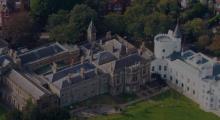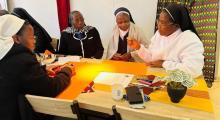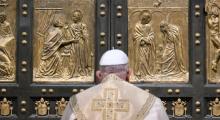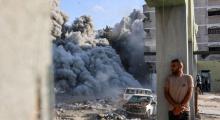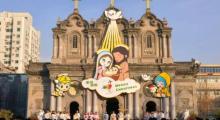Issued by the Catholic Center for Studies and Media - Jordan. Editor-in-chief Fr. Rif'at Bader - موقع أبونا abouna.org
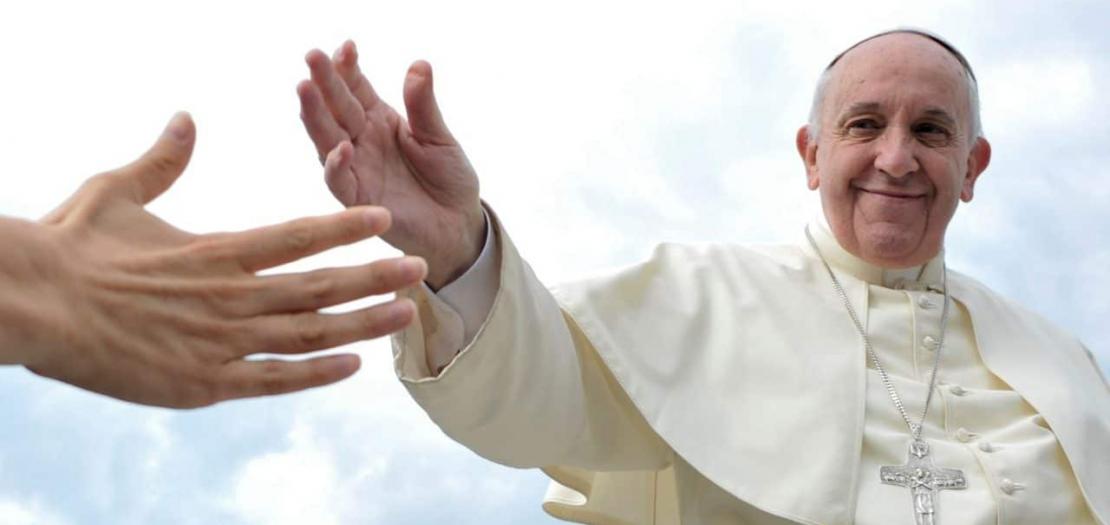
“We, Greek Catholics, are a small community. So it’s easy to feel isolated,” Jesuit Archbishop Theodoros Kontidis, Archbishop of Athens, admitted in an exclusive interview with Exaudi’s Editorial Director & Vaticanista who will be aboard the Papal Flight with Pope Francis. Hence, Pope Francis’ presence “will be an occasion to experience a stronger union in the faith with the universal Church.”
On December 4, Archbishop Kontidis will welcome the Pope on his arrival in Greece from Cyprus, in the capital’s airport, twenty years after Saint John Paul II’s historic trip. Protests of some groups of the Orthodox Church (to which the great majority of Greeks belong) against the Pope’s presence in Athens were not lacking on that occasion. Today “we are far from those oppositions of twenty years ago,” said the Archbishop. The Holy Father’s papal trip will be a step closer to the Orthodox world, which in face of the challenges of secularization is an ally for the Catholic Church.”
However, even if the welcome of the Pope by the majority of Greeks is “benevolent,” Archbishop Kontidis doesn’t hide the difficulties of ecumenical relations in Greece. On one hand, “the Orthodox Churches resist better the current of secularization,” on the other hand “everything that might threaten the Tradition is rejected,” he added. And beyond the personal friendship, which in any case is possible, “no Orthodox bishop would risk internal fractures to create closer bonds with the Catholics.”
In conclusion, Archbishop Kontidis hopes that Francis’ visit will leave the legacy to the Greeks of ”a greater interest in those who are different from me,” he said.
Following is the text of the interview:
EXAUDI: Archbishop Kontidis, if you were to describe the importance and meaning of Pope Francis’ trip to Greece, what would you say?
ARCHBISHOP KONTIDIS: I would say it’s a step closer to the Orthodox world. Today, especially in the West, there are many challenges for the Catholic Church. However, if Catholics and Orthodox were more united between them, then the Christian witness would become stronger and more profound. The Orthodox Churches, and I’d say the Orthodox Tradition in general, resists secularization better. The Orthodox has great respect for the Spiritual Tradition; they don’t reject it. Even those who are not close to the Church identify themselves in any case with the spiritual tradition of their country and their community.
In face of the challenge of secularization, Orthodoxy is an ally for Catholics. And regarding Greece in particular, the Pope’ presence will be like an open window on the outside world. Greek society is a very homogeneous society, at least up to today. Often our gaze is limited to our area, to our small house, and it doesn’t open enough to the world of which we are a part.
EXAUDI: And for Catholics in particular, what does it mean to welcome the Pope in Greece?
ARCHBISHOP KONTIDIS: Then, for the Catholic community, the Pope’s presence must be seen as a call to faith in Christ and in the Gospel. At the same time, it will be an occasion to experience a stronger union in faith with the universal Church. We Catholics, as a small community, feel isolated; the Pope will make us feel more united to the universal Church.
EXAUDI: What welcome will Francis receive in Greece?
ARCHBISHOP KONTIDIS: He will be received, by majority of the population, with benevolence. Pope Francis is known for his sensitivity to the poor and his evangelical simplicity. But there are also minorities or some movements attached in a mistaken way to their identity and Tradition. They don’t want any influence from outside and no foreign presence, because they see it as a threat. There are groups of that sort in every country and, hence, also in the Orthodox Church. Even some Bishops are part of it. However, even if they know how to make themselves noticed, it’s not necessary to overestimate their real influence.
EXAUDI: When John Paul II visited Greece in 2001, there were also some sectors of the Orthodox Church that staged protests in Squares against the Pope’s arrival. In your opinion, has the atmosphere changed since then or not?
ARCHBISHOP KONTIDIS: Also twenty years ago when John Paul arrived in Greece, the atmosphere became positive from one day to the next. They all saw that he was a person seeking dialogue with the Orthodox, benevolent, certainly not a threat to Greece. Now those opposition groups are much smaller, I’d say almost insignificant. However the Orthodox Church, that is to say the hierarchy also, cannot but take into account the different sensibilities of the whole of the clergy and the faithful; it must maintain certain balances. Hence it will be cautious. The Orthodox does not want common prayers or common celebrations. There won’t be this sort of events. But we are far from the oppositions of twenty years ago.
EXAUDI: How do the Greek people see Francis? What do they write about him in general in the newspapers?
ARCHBISHOP KONTIDIS: Here, it’s not that there is talk of the Pope every day. In any case, he remains a known personality, although foreign. The Orthodox don’t understand what the Pope means to Catholics. They see the papacy as an historical result of a struggle for power. But the world in general doesn’t understand who the Pope is. This is predictable, not a surprise. For us Catholics, to follow the Pope is a question first of all of spirituality, of the universality of the Church, beyond any political, ethnic or ideological border. Instead, the Orthodox Church is structured in Churches whose borders correspond to those of the nations, and this is the difference with Catholics. Orthodoxy is made up of many national Churches. For Catholics, instead, the Church is universal and the Pope is the guarantor of her unity.
This being said, Greeks’ image of Francis is positive; it’s that of a simple man, close to the people and sensitive to humanity’s problems.
EXAUDI: How many Catholics are there in Greece? Are they foreigners or natives to the place? And how would you describe the life and the pastoral challenges of a Catholic Church, which is a small minority?
ARCHBISHOP KONTIDIS: Greek Catholics are less than 1% of the national population. Over the last 30 years new Catholic communities have arrived in Greece from diverse provenances and have greatly changed the face of our Church: Poles, Albanians, Filipinos, Iraqis, Africans, etc. To have unity among so many different communities is a challenge, but also a great task!
EXAUDI: At what point in Greece is the dialogue between Catholics and Orthodox? And in your opinion, what impetus will Pope Francis give this dialogue?
ARCHBISHOP KONTIDIS: The answer depends if we are talking of ecumenism at the official, formal level or of personal relations. At the level of personal relations, we can truly be friends, discuss freely, we recognize one another’s riches. However, when we speak of ecumenism at the formal, official level, the answer is the exact opposite: nothing moves and the differences seem to be insurmountable obstacles. The Orthodox Church wants to defend her unity. No Orthodox Bishop would risk internal fractures to create closer bonds with Catholics. It’s the Tradition that brings about the unity of the Orthodox Church It’s for this reason that all that might threaten the Tradition is rejected. Closeness with the Catholic Church puts new ideas in circulation and this seems to be a threat for many Orthodox.
EXAUDI: Francis will also carry out a second brief visit to Lesbos, after that of 2016.The Pope has often accused Europe of not being hospitable to refugees, erecting walls on their border to keep them away. Greece is a fundamental point of passage for those of the Middle East, for those that want to reach European countries of the north. What more should Greece do in favor of these people?
ARCHBISHOP KONTIDIS: I don’t know how to answer this question, as it’s a complicated question at the social as well as the political level. I think the Pope’s gesture is made for Europe and for the entire world. We must acknowledge that to share is necessary for others and for ourselves.
EXAUDI: What legacy do you hope the Pope will leave in Greece?
ARCHBISHOP KONTIDIS: I hope a greater interest in those who are different from me.


